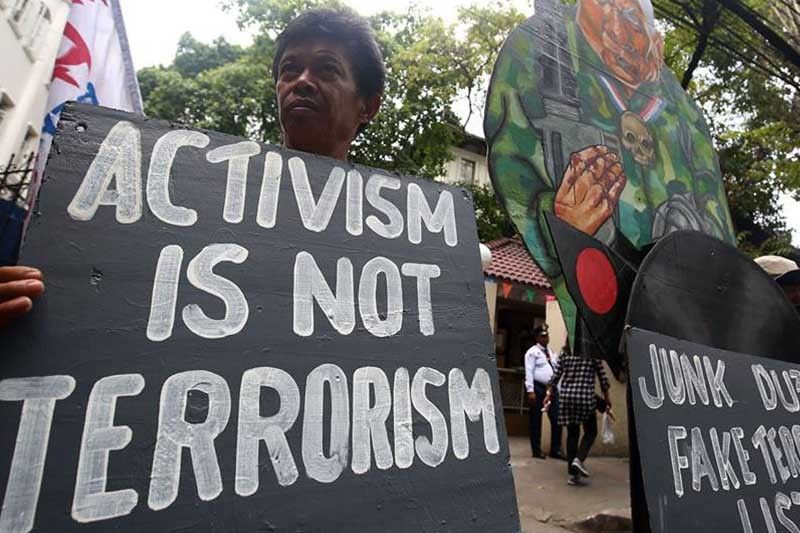Key provisions in the anti-terror law’s implementing rules and regulations

MANILA, Philippines — The Department of Justice released Saturday to the public the Anti-Terrorism Act of 2020’s implementing rules and regulations, which seeks to further clarify provisions in the controversial law which has been criticized for being overbroad.
President Rodrigo Duterte signed Republic Act 11479 or the ATA on July 3, amid mounting criticism against the law deemed by law experts as infringing on the peoples’ freedom.
The anti-terrorism law is facing at least 37 legal challenges at the Supreme Court. It is one, if not the most, highly contested laws before the tribunal.
Petitions against the law came from Constitution Framers, legal luminaries such as former SC acting chief justice Antonio Carpio, law academe, lawmakers, religious leaders, community leaders from Mindanao, and dozens of civil society groups.
A petition filed by youth leaders, filed through the National Union of Peoples' Lawyers-National Capital Region, earlier said that the IRR cannot be used to remedy the "defects" of the anti-terrorism law.
“Trying to ‘correct’ the glaring and inherent defect in the assailed law through its implementing rules must be avoided because of the dangers accompanying such a proposition, not the least of which is the unwarranted discretion being given to the law-enforcer when he is asked to set the rules for the implementation of a vague law,” they said.
Here are some key provisions of the ATA’s IRR:
Dissent protected if...
The implementing rules and regulations of the anti-terrorism law reiterates that advocacy, protest, dissent, stoppage of work, industrial or mass action, creative, artistic and cultural expressions, or other similar exercises of civil and political rights are not considered as acts of terrorism provided that it is not intended to cause death or serious physical harm, endanger a person’s life, or create a serious risk to public safety.
The burden to prove that there is such intent to cause harm, death, danger and a serious risk to public safety lies with the prosecution, according to the IRR.
Context needed
The anti-terrorism law bans speeches speeches, proclamations, writings, emblems, banners and other representations that incite to commit terrorism and punishes it with 12 years of imprisonment.
Under the IRR, context must be considered in analyzing whether these materials do incite people to commit terrorism.
“Analysis of the context should place the speech, proclamations, writings, emblems, banners, or other representations within the social and political context prevalent at the time the same was made and/or disseminated,” Rule 4.9(a) of the IRR states.
The content and form of speeches and acts must also be considered. The IRR provides that the degree to which the speech or act was provocative or direct must be analyzed, as well as the form, style or nature of arguments deployed in the speech, or the balance struck between the arguments deployed.
The IRR also states that the position or status in society of the speaker or the actor should be considered, along with the intent, extent of the speech or act, and the direct causation between the speech or act and the incitement.
Tagged terrorists to be published
The Anti-Terrorism Council, headed by the executive secretary and other Cabinet officials, is given the power to tag people and organizations as terrorists by designating them as such.
The IRR provides that the ATC’s designation of terrorists should be published in a newspaper of general circulation, the online Official Gazette and the office website of the ATC.
Those tagged as terrorists may file a verified request for delisting before the ATC within 15 days from publication of the designation on the following grounds:
- Mistaken identity
- Relevant and significant change of facts or circumstance
- Newly discovered evidence
- Death of a designated person
- Dissolution or liquidation of designated organizations, associations or groups of persons
- Any other circumstance which would show that the basis for designation no longer exists
Warrantless arrests
Under the IRR, only warrantless arrests authorized by the Anti-Terrorism Council are allowed to last for up to 14 days, otherwise suspected terrorists may only be detained by law enforcement authorities for up to 36 hours.
However, if law enforcement authorities are able to secure an authorization from the ATC for the warrantless arrest of suspected terrorists, they can keep them detained for up to 14 days.
The 14-day period of detention can also be extended by 10 more days, meaning a suspected terrorist may be detained for up to 24 days. — Xave Gregorio with reports from Kristine Joy Patag
- Latest
- Trending































